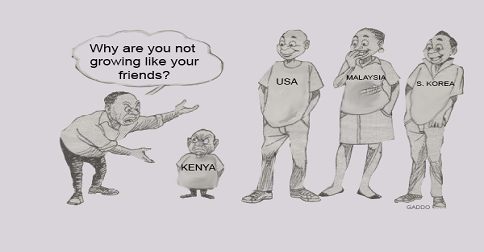A lot has been done to encourage entrepreneurship in Kenya. However, despite all the conferences, trainings, seminars, counseling sessions, SME financing and so forth we still don’t seem to be getting it right.
Think of it this way – How many life-changing innovations have been born in Kenya over the last 10 years? So far only Mpesa has managed to achieve this feat. 99% of our entrepreneurs are more concerned about hand-to-mouth issues and it’s no wonder we’re such a stagnant nation as far as innovations are concerned.
But what really ails our business culture?
1.Little investment in research and development
Most of our businesses are built upon a myopic foundations. We simply want to increase the profit margins and spending the least possible amounts on research and analytics. We care so much about today that we don’t think much about tomorrow.
In more progressive countries such as the USA, companies such as Apple and Microsoft are always researching and imagining the future. They are busy looking for ingenious ways to solve current and future problems.
What about our companies? Well, they are busy engaging in price-wars and looking for an opportunity to exploit an unsuspecting consumer.
2.Unhealthy competition practices
Competition is a good thing – in fact without competition there would be no innovations. But there is a very thin line between healthy and unhealthy competition practices.
In this country for instance, when a small company tries to come up, the big ones unite to choke it at infancy stages. From all sorts of legal battles to hiring of goons and macho men to intimidate opponents; the big companies will do anything to retain control of the market and suffocate new inventions that are likely to drive them out of business.
And the Kenyan shopper is not any better than these goons. He’s slow to embrace local-made products and will even go to the extent of pirating such innovations just to make a quick kill.
It is no wonder we have created foreign monopolies that control the markets with their unruly practices which are condoned by the government.
Related: Don’t Do These 6 Things If Your Business Fails
3.Maybe we’re not as innovative as we think
Look around you, how many companies do you know that sell their own innovations? Most of our so called entrepreneurs are simply re-sellers. They’re not innovators. They either re-sell imported clothes, imported cars, imported water etc. How does re-selling imported things make you an innovative entrepreneur?
Why can’t we get more Tabitha’s to start more Keroche breweries? Why not encourage more Sam Gichurus to lead the path of tech innovations? Why not get more Barclay Paul’s to make cheaper sanitary towels for our market?
For now, majority of entrepreneurs are simply hawkers. All they do is try to squeeze a living out of other countries innovations by simply playing the middle-man role. Sorry this is a little harsh but our ratio of hawktrepreneurs to real entrepreneurs is 9:1.
4.We have infiltrated our systems with corruption
Corruption forms every part of our DNA and it’s no wonder we can’t make any meaningful progress. How do you expect our local entrepreneurs to be innovative while corrupt lords are busy smuggling cheap substandard products through our porous borders?
Indeed, it takes a lot of effort for an upcoming entrepreneur to land a government tender all thanks to the incredible levels of corruption in various institutions. Don’t forget that we have a very slow way of doing things – thanks to our “amazing” bureaucratic way of doing things.
5.Politics’ our daily bread
The truth is that we have spent most of our time over the last one decade politicking. The mood and environment isn’t generally suited for innovations. Moreover, we have created barriers within our country through ethnic animosity.
An entrepreneur has to think twice before launching his business nation-wide lest he or she finds himself in an unfamiliar territory where people view him as “an outsider” or “invader”. Our politics, our hatred and our inequity have so far served to restrain our would-be big companies from growing beyond imaginary barriers that we’ve created through tribal bigotry over time.
6.We’ve left our online marketplace to college students and teenagers
While the rest of the world is busy embracing the internet as a faster way to shop, do business and market things, Kenyans still view the online marketplace as a preserve for college students and teenagers. In fact majority simply use the internet to chat on Whatsapp, Facebook and Twitter, full stop.
A spot check at most online retail outlets clearly shows that majority of their customers and fans are majorly in the 18-24 age cohort. Given that most of the people within this age bracket don’t have significant purchasing and decision making power, it proves quite difficult for our own online shops to grow to the stature of Amazon or eBay.
Not until the older guys (Particularly the middle class section of our community) stop thinking that they are too mature for the internet shopping, then most of our shops will either remain small or crash out of the market completely. All the same, there is still hope in the future
Related: Starting an Online Business in 6 Simple Steps
7.We’ve had our fair share of problems
Let’s face it, despite committing all of the mistakes above we have had to contend with our fair share of problems as a nation. From a series of referendums to a growing threat of terrorism and constant infrastructural issues – life has indeed been tough for us.
Don’t forget that we are still an emerging nations and as it is the case with any growing creature – teething problems are unavoidable. Even as we seek to get our entrepreneurial hustle on, let us appreciate that our resilience is our armour.
Final Word;
What ails our small business is not something as huge as Mount Kenya or as wide as Thika Superhighway (pun intended). It’s a problem that lies within our minds and is fueled by our social beliefs and perceptions.
The core thing to keep in mind is that we still need to pay more attention to research and development so that we can create our own identity and market our own innovations.
In your opinion why is it that Kenyan innovations hardly achieve national or global excellence?





















